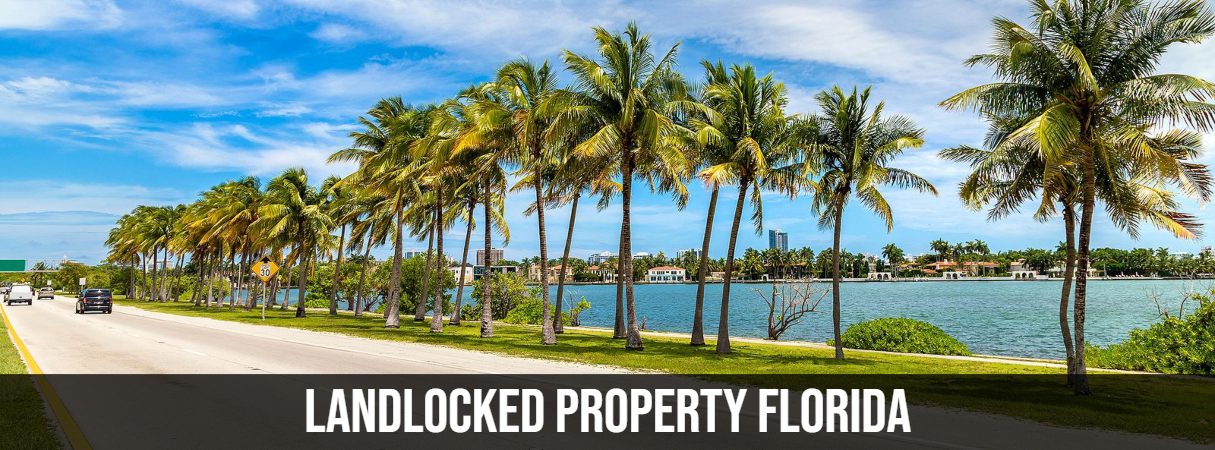
Owning a piece of land sounds like a dream, right? A place to call your own, build your home, maybe plant a garden… But what happens when that dream plot of land has one small hitch—you can’t actually get to it? Welcome to the wild world of landlocked property Florida, where your land is surrounded by others, and access isn’t exactly as easy as Sunday morning. Don’t worry, though; with a bit of legal maneuvering and some good old-fashioned know-how, even a landlocked property can be a worthwhile investment. Let’s dive into the quirks and intricacies of owning one of these elusive plots in the Sunshine State.
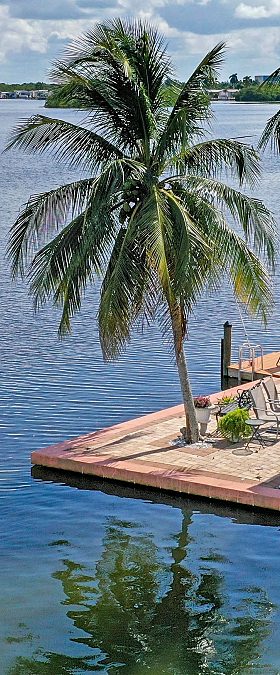
What is Landlocked Property?
Definition & Common Issues
First things first, what exactly is landlocked property? Picture this: your property is like an island, but instead of being surrounded by water, it’s encircled by other people’s land. No road, no driveway, not even a footpath. Getting to your land involves crossing someone else’s property, which can make things, let’s say, complicated. And let’s face it—neighbors aren’t always eager to let you traipse across their yard whenever you feel like it. This lack of direct access can lead to some sticky situations, not to mention legal headaches. But hang tight—we’ll get into the solutions later.
Legal Implications in Florida
Now, before you start imagining yourself as some sort of landlocked pirate, it’s important to understand the legal side of things. Florida has its own set of rules and regulations when it comes to landlocked property. You can’t just start blazing a trail through your neighbor’s backyard, no matter how tempting that shortcut may be. Instead, Florida law recognizes the need for access and provides legal avenues (pun intended) to help landlocked property owners. But, like anything involving the law, it’s not as simple as waving a magic wand. You’ll need to familiarize yourself with terms like “easement by necessity” and “prescriptive easement,” both of which can be your ticket out of landlocked limbo.
Causes of Landlocked Property in Florida
Historical Land Division
Ever wonder how land ends up in such a pickle? Well, a lot of it has to do with how land was divided way back when. Picture early settlers, each claiming their piece of paradise, without a care for future access needs. Fast forward a few decades, and you’ve got a patchwork quilt of properties, with some pieces stranded in the middle. It’s a bit like playing Tetris, only with way more paperwork involved.
Changes in Land Use & Development
But it’s not just the old-timey land divisions that cause these problems. Modern development can also play a part. As cities expand and land use changes, parcels that once had access can suddenly find themselves cut off. Maybe a new development springs up next door, and suddenly your once-connected property is left out in the cold. It’s the kind of plot twist that makes real estate a never-ending adventure.
Inheritance & Property Division
Let’s not forget about good ol’ inheritance issues. Family land passed down through generations can sometimes result in a piece of property being divided like a pizza—except someone forgot to leave you a slice with road access. It’s the kind of family drama that could make for a juicy episode of daytime TV, but instead, it’s just another day in the life of a landlocked property owner.
Legal Rights & Easements in Florida
Understanding Easements
Alright, time to roll up our sleeves and talk easements. An easement is like a golden ticket that grants you the right to cross someone else’s land to get to yours. It’s a way to legally solve the access problem without having to resort to ninja-like maneuvers over your neighbor’s fence. Easements come in handy more often than you might think, especially in Florida, where the mix of old and new development creates a perfect storm for landlocked properties.
Types of Easements in Florida
In Florida, easements come in different flavors. There’s the easement by necessity, which is your go-to when you have absolutely no other way to access your property. Then there’s the prescriptive easement, which is a bit like earning access rights through long-term use, kind of like a loyalty program, but with legal documents instead of points. Each type has its own set of rules, and knowing which one applies to your situation can make all the difference.
How to Obtain an Easement
So, how do you get your hands on one of these easements? The process involves some legwork—both figurative and literal. First, you’ll need to establish that you’re truly landlocked, with no alternative access. Then comes the fun part: negotiating with your neighbors. If that sounds about as appealing as a root canal, don’t worry—you can always call in a real estate attorney to do the heavy lifting. And if all else fails, there’s always the option of taking the matter to court. Just remember, the road to an easement can be a bumpy one, but it’s worth the journey if it means gaining access to your land.
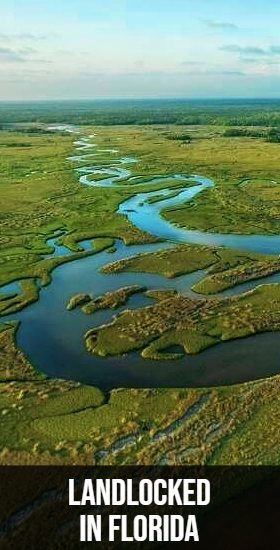
Navigating the Legal Process
Hiring a Real Estate Attorney
If there’s one piece of advice to take from this, it’s that a good real estate attorney is worth their weight in gold—especially when dealing with landlocked property. These legal eagles know the ins and outs of Florida property law and can help you avoid any missteps along the way. Think of them as your guide through the legal jungle, helping you swing from one step to the next without falling into any traps.
Steps to Resolve Landlocked Property Issues
Resolving landlocked property issues isn’t a sprint; it’s a marathon. You’ll need to start by identifying the problem, gathering evidence, and possibly going through negotiations or legal proceedings. Each step is crucial, and missing one could set you back. It’s a bit like putting together a jigsaw puzzle—you’ve got to find the right pieces and fit them together just so. But with patience and persistence, you’ll eventually see the full picture.
Selling Landlocked Property in Florida
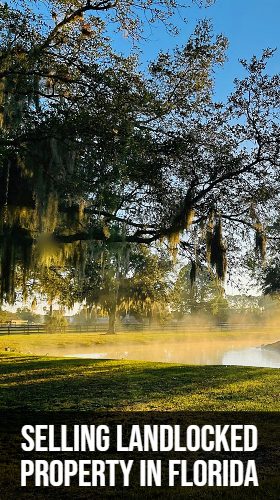
Challenges of Selling Landlocked Property
Thinking about selling your landlocked property? Well, you’re in for a bit of a ride. Selling a landlocked property is a bit like trying to sell a car without wheels—it’s a tough sell, to say the least. Buyers may be hesitant, knowing they’ll have to tackle the access issue head-on. This can lead to lower offers and a longer time on the market. But don’t lose hope—there are ways to make your property more appealing.
Improving Marketability
One way to sweeten the deal is by solving the access problem yourself. If you can secure an easement or at least have the process underway, you’ll make your property a lot more attractive to potential buyers. Think of it as adding a new coat of paint to a house—suddenly, everyone’s interested. Alternatively, highlighting the property’s potential for specific uses, such as agricultural or recreational, can also help attract the right kind of buyer.
Working with Real Estate Investors
Another option is to work with real estate investors. These folks are used to dealing with properties that come with a few strings attached and may be more willing to take on a landlocked property. They’ve got the know-how to navigate the legalities and can often close deals quickly, making them a good option if you’re looking to sell without too much fuss.
Alternatives to Selling
Leasing Your Landlocked Property
If selling isn’t in the cards, leasing might be. There’s a market for leasing landlocked properties, especially for agricultural or recreational purposes. You won’t need to solve the access issue right away, and you can still generate income from your land. It’s a win-win situation, as long as you find the right tenant.
Developing the Property
Thinking bigger? Developing your landlocked property is another option. While it may require more time and investment, the payoff can be worth it. By developing the land, you can potentially increase its value and attract buyers or tenants who see the property’s potential. Just be prepared for a bit of a challenge—after all, good things rarely come easy.
Conclusion: Owning Landlocked Property Florida
So, there you have it—everything you need to know about landlocked property in Florida. From understanding the ins and outs of what landlocked property really means to navigating the often confusing legal maze that comes with it, we’ve covered the essential bases. Whether you’re grappling with the concept of easements or exploring your options for selling, leasing, or even developing your landlocked gem, you’re now armed with the knowledge to move forward confidently.
The road may be a little bumpy—much like trying to find your way to a landlocked parcel without a map—but with the right approach and a little perseverance, you can turn what might seem like a troublesome piece of land into a valuable asset. It’s all about perspective and strategy. What initially appears to be a challenge could very well be an opportunity in disguise.
Think of it this way: landlocked properties are like hidden treasures. They might require a bit more effort to uncover, but once you’ve cracked the code, the rewards can be substantial. Whether it’s securing that all-important easement, finding a creative use for the property, or positioning it in a way that attracts the right buyers, the possibilities are as endless as the Florida sunshine.
So, what’s next? It’s time to take that first step, whether it’s reaching out to a real estate attorney, starting the process to obtain an easement, or considering how to market your property effectively. Remember, every piece of land has potential—it just takes a bit of vision and determination to bring it to life. Don’t let the challenge of being landlocked hold you back; instead, see it as the beginning of an exciting journey toward unlocking your property’s true value.
Frequently Asked Questions (FAQs)
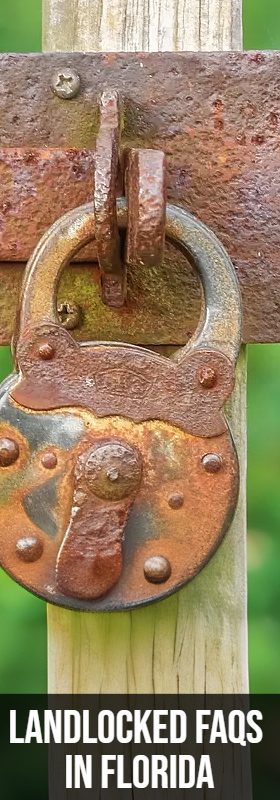
What Is a Landlocked Property, and How Can I Access It in Florida?
A landlocked property is a piece of land that doesn’t have direct access to public roads or thoroughfares. In Florida, accessing a landlocked property often involves obtaining an easement from a neighboring property owner, which legally allows you to cross their land to reach yours.
What Are My Legal Rights if I Own a Landlocked Property in Florida?
As a landlocked property owner in Florida, you may have the right to an easement by necessity, which allows you to access your land. Florida law recognizes that property owners need a way to reach their land, and you can seek legal assistance to establish this right if necessary.
How Do I Obtain an Easement for My Landlocked Property in Florida?
To obtain an easement, you typically need to negotiate with neighboring property owners. If negotiations fail, you may pursue legal action to establish an easement by necessity or prescriptive easement. Consulting with a real estate attorney can guide you through this process.
Can I Sell My Landlocked Property in Florida, and What Challenges Might I Face?
Yes, you can sell a landlocked property in Florida, but it can be more challenging due to the lack of access. Potential buyers may be wary of the access issues, so securing an easement or exploring other creative solutions can make your property more marketable.
What Are My Options if I Can’t Obtain an Easement for My Landlocked Property in Florida?
If obtaining an easement isn’t possible, you might consider alternative uses for your landlocked property, such as leasing it for agricultural or recreational purposes. In some cases, developing the property might still be an option, depending on the specific circumstances and local regulations.